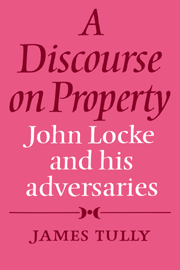
-
Select format
-
- Publisher:
- Cambridge University Press
- Publication date:
- October 2009
- July 1980
- ISBN:
- 9780511558641
- 9780521271400
- Dimensions:
- Weight & Pages:
- Dimensions:
- (228 x 152 mm)
- Weight & Pages:
- 0.331kg, 212 Pages
- Subjects:
- History, History of Ideas and Intellectual History
You may already have access via personal or institutional login- Subjects:
- History, History of Ideas and Intellectual History
Book description
John Locke's theory of property is perhaps the most distinctive and the most influential aspect of his political theory. In this book James Tully uses an hermeneutical and analytical approach to offer a revolutionary revision of early modern theories of property, focusing particularly on that of Locke. Setting his analysis within the intellectual context of the seventeenth century, Professor Tully overturns the standard interpretations of Locke's theory, showing that it is not a justification of private property. Instead he shows it to be a theory of individual use rights within a framework of inclusive claim rights. He links Locke's conception of rights not merely to his ethical theory, but to the central arguments of his epistemology, and illuminates the way in which Locke's theory is tied to his metaphysical views of God and man, his theory of revolution and his account of a legitimate polity.
Reviews
'This study makes an invaluable contribution to our knowledge and understanding of Locke and the natural law and natural rights tradition. There is no comparable study anywhere, in any language. We badly need to have this careful, scholarly examination of that important concept in Locke's political philosophy, property.'
John Yoltori
'… the best and the most important piece of extended analysis of Locke's political theory on the issue of property to have been produced by a twentieth-century scholar.'
John Dunn
'… Tully has succeeded brilliantly in recovering all that was implied in Locke's theory of property.'
David Lieberman Source: The Times Literary Supplement
'… Undergraduate students of politics will learn from it how carefully a text should be treated.'
G. J. Hughes Source: The Times Higher Education Supplement
'… a major and profound reassessment of Locke.'
Mark Goldie Source: History
Contents
Metrics
Altmetric attention score
Full text views
Full text views help Loading metrics...
Loading metrics...
* Views captured on Cambridge Core between #date#. This data will be updated every 24 hours.
Usage data cannot currently be displayed.
Accessibility standard: Unknown
Why this information is here
This section outlines the accessibility features of this content - including support for screen readers, full keyboard navigation and high-contrast display options. This may not be relevant for you.
Accessibility Information
Accessibility compliance for the PDF of this book is currently unknown and may be updated in the future.


